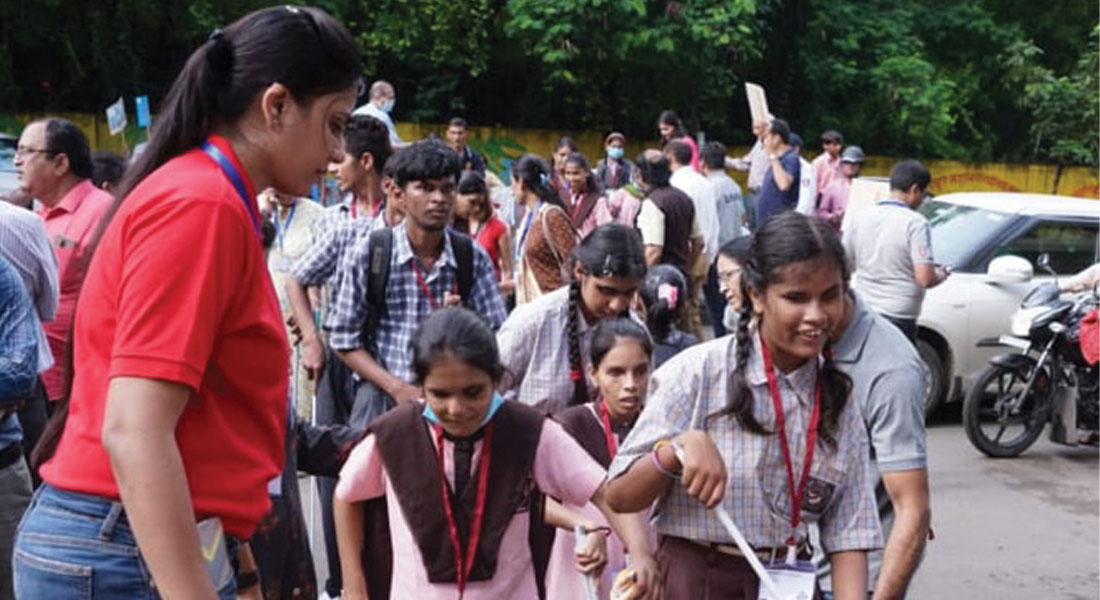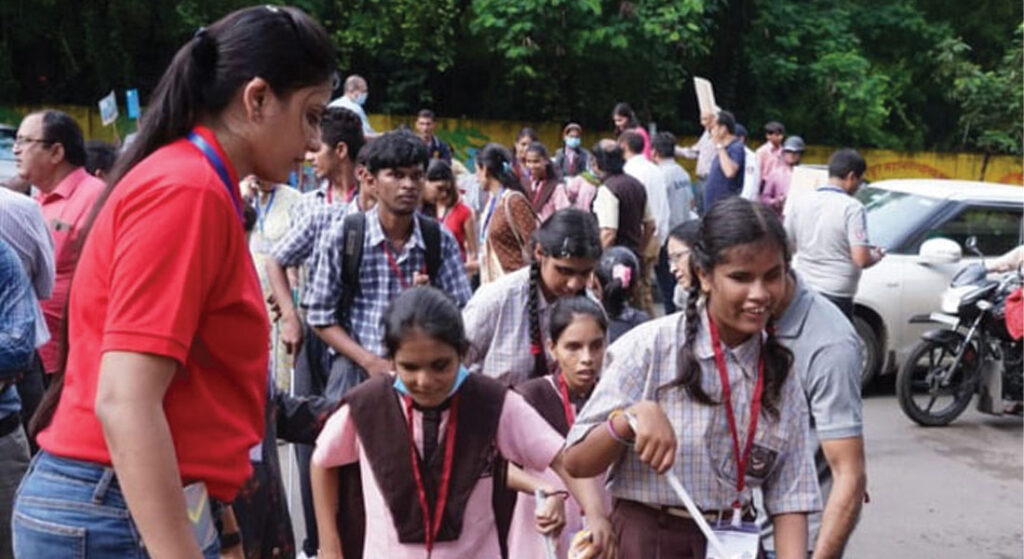Bharat and his two friends are flushed with excitement after climbing a flight of about 15 steps of an office building. “I feel like I have summitted the Everest. It is the first time in my life I have climbed up stairs without assistance,” he says. It was indeed an achievement for these young boys who are blind and who have been leading their day-to-day lives with assistance at every step. Today they are brimming with joy to be able to walk independently, cross the road, identify vegetables and cereals, and eat food confidently without groping on their plates. These youngsters and 200 other visually-impaired people owe it all to RC Nagpur Ishanya, RID 3030, for the two-day rehabilitation workshop organised at Nagpur.

“It all began when we drew up a schedule for a mobility workshop for the blind for an entry in the Asia Book of Records,” says club secretary Dr Manisha Prashant Rathi. Until now, the Book does not feature any record for providing professional training to the blind to use the white cane, “and we decided to be the first,” she adds. The club is waiting for the adjudication.
“Record or no record, we are happy to have made a huge difference in the lives of these people who would otherwise think twice before stepping out of their comfort zone. Today each one of them is putting all that he/she has learnt into practice and is raring to go,” says an excited club president Naresh Baldwa.
Record or no record, we are happy to have made a huge difference in the lives of these people who would otherwise think twice before stepping out of their comfort zone.
— Naresh Baldwa, president, RC Nagpur Ishanya
The workshop has hugely benefitted Palash Hedau, a college student. “The white cane is my sarathi (charioteer) and my eyes. Now I can use the road confidently and even cross without fear. Earlier I would wait helplessly on the roadside for some good soul to guide me.” He is happy to identify the rajma, channa and poha on his plate. “It is nice to know what I eat,” he smiles.
Ishwari Kamleshpande, a para swimmer, is now happy to identify birds by their sounds while Gunwant Yelne is glad to “feel the beauty of life through our other sense organs. These two days have taught me to live life fully and rise above my physical challenges.”
Resource person Swagat Thorat and his team provided exhaustive training in proper use of the white cane to travel safely and access public transportation. “In Maharashtra only very few teachers are there to teach correct usage of the cane and provide mobility training. So, most blind people are not confident enough to step out alone beyond their comfort areas,” says Manisha.
Two techniques — two-point touch and shoreline — are followed by the blind to skilfully navigate their way, and these were taught at the workshop. The resource team shared such useful tips: “If there is an escalator, place the cane on the moving area to determine if it’s upward or downward. If the cane pulls away from you, it’s going up; When going up the stairs, remember that the final hit as you probe with your cane means that you have one more step to go. When going down, you also have to make one more step before you are safely on the ground. Your head should be held high and shoulders kept relaxed while moving.”
The students were also trained to activate the midbrain which transmits information for motor movement, vision and hearing, and were taught to identify directions, objects, fruits, vegetables and cereals.
The club provided white canes to the delegates. The Rotarians were initially taught to use them and they mastered the act by being blindfolded. Students were drawn from schools for the blind from Nagpur, Chandrapur, Badravati, Wardha and Katool, and their transportation, accommodation and food were taken care of by the club. The club spent ₹3.5 lakh for the workshop.
Live sessions were conducted where the students were taken to the city’s busy road. “It was soul satisfying to watch them cross the road confidently guided by their white canes during peak traffic. They were taught to judge vehicle distances by the sounds of the horn. The Nagpur traffic police helped us in regulating the traffic.” Rotaractors of the club’s three Rotaract clubs volunteered at the workshop. They held placards at traffic junctions to sensitise the public on the challenges faced by the blind, keep the pavements encroachment-free, and slow down or stop the car to allow them to pass at their pace.
Post the workshop, on White Cane Safety Day (Oct 15), the club conducted a follow-up. “We were amazed to hear that they are exploring new places armed with their white canes, and without any handholding or assistance,” says Manisha. The club helped a couple of them who were skilled acupressure practitioners with placements. “Some of the youngsters who had attended the workshop are now moving out of their comfort zone for work opportunities. The new independence is helping them go out and pursue their dreams.”







